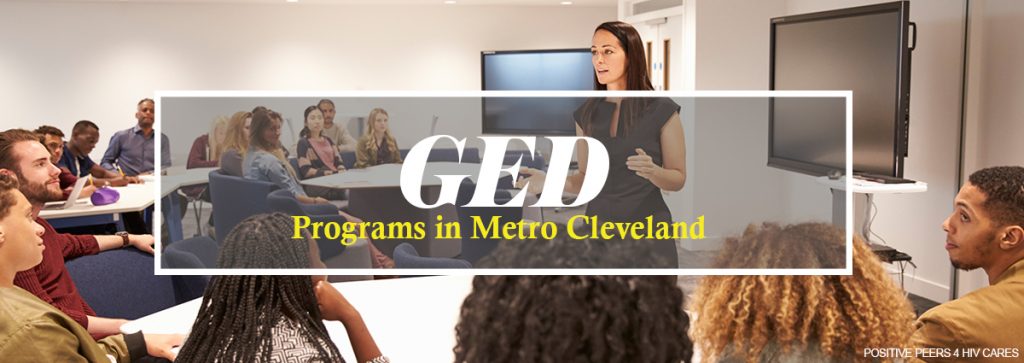
By: Jennifer McMillen Smith, LISW-S, HIV Social Worker at MetroHealth Medical Center and medically reviewed by Ann K. Avery, MD, Infectious Disease Physician at MetroHealth Medical Center
HIV should never stand in the way of your goals, and that includes landing your dream job! For some careers, that may mean continuing your education — but college isn’t for everyone. Thankfully, it’s also not the only option.
Lots of good-paying jobs can be earned with a GED and a year or two of hitting the books in the classroom. If you don’t have much money to pay for school, you can get financial aid to help you out.
At the end of the day, college is just one way to improve your career outlook. Here are some more ideas:

Getting your GED
If you didn’t finish high school, you’re not the only one. The thing is, though, that we need money to get by, and not having a diploma can make it hard to earn enough money for you to live the life you’d want to be living.
And it’s not all about the money. Getting a diploma or GED also gives you a solid basis of knowledge that you’ll be able to use for the rest of your life. Getting a GED opens you up to career training that can put you in a good-paying gig. For most employers, it’s looked at like it’s the same as having a high school diploma.
ASPIRE Greater Cleveland offers free GED classes at:
- Cuyahoga County Public Library branches (sample event)
- Cleveland Public Library branches (locations and info)
- Merrick House (more info)
- Ohio Means Jobs (locations)
- Seeds of Literacy (classes, locations)
- Tri-C (Cuyahoga Community College) Western Campus (info)
Classes meet in the mornings, afternoons, and evenings. Call 1-833-277-4732 to create a customized schedule that fits your needs and available time. They’ll explain the details and help you find a location that’s most convenient.
If you need help with reading, writing, or mathematics, you can get started on improving those skills as soon as you’re ready. That’ll help at every phase of your career.
Come join our private, stigma-free, supportive community.
Health management tools with medication & appointment reminders.
Social networking in a community conversation & private chats.
Job-training programs
Cuyahoga Community College (Tri-C) has an Adult Diploma Program for people aged 22 and older. It’s designed to get you your GED and then get you trained for some of Ohio’s most in-demand jobs.
The program takes time, patience, and determination, but if you’re ready to dig in, start achieving, and improve your life, it could be a great option for you. There’s testing to make sure you have the skills to do the work before you get a certificate.
These are some of the programs:
- Certified Production Technician
- Introduction to Welding
- Truck Driving/CDL Class A and B
- State Tested Nursing Assistant
- 911 Emergency Medical Dispatch
- Microsoft Administrative Professional
Find out more about the program.
NewBridge provides local arts and education training programs including:
- Phlebotomy — learning to take blood samples at laboratories
- State Tested Nursing Assistant (STNA)
- Culinary training for working in restaurants and hospitality
Cleveland Job Corps helps young Americans develop job skills. Many of them get outside the classroom and learn by doing at job sites, where they discover the importance of work ethic, teamwork, and staying excited about their career.
Programs include:
- Bricklaying
- Facilities maintenance
- Carpentry
- Certified Nurse Assistant (CNA)
- Pharmacy Technician
AmeriCorps is a network of national service programs whose members dedicate their time and skills to improving and strengthening local communities around the United States. As a member of AmeriCorps you get training, develop new skills, earn money for your education (or loans), and health insurance. You also get hands-on experience in different career fields that may help you build your professional network and maybe even land a job after your service!
Find out more and consider starting your service adventure today!
Trade schools
These schools may provide up to two years of classroom training required to succeed in specialized careers. You might be surprised to learn that many careers pay over $75,000 a year at mid-career and require only an associate’s degree. You won’t make that much to start, but your earnings should pick up quickly in the first few years on the job.
One thing you have to watch about trade schools is the high cost in the short run. You’ll earn the money back several times during your career if you complete your degree or certificate, but you have to be ready for the up-front cost.
Keep in mind, though, that if you’re an independent student and not making much money, scholarships and grants can pay for a lot of your costs, and you can use student loans for the rest. Don’t let the price tag scare you off.
These links should help you out:
Rethink Cleveland lists several trade schools and training programs for careers in areas such as:
- Automotive Repair
- Welding Technicians
- Dental and Medical Assistants
- Electronics and Computer Repairs
Central School of Practical Nursing is one of the country’s oldest schools for Licensed Practical Nurses (LPNs). Their intensive one-year program prepares people to work as LPNs, who are the nurses who spend the most time taking care of patients. Getting an LPN certification can be the first step toward becoming a Registered Nurse, which is one of those great-paying jobs requiring a two-year degree.
Choose your training program wisely
It’s probably not a good idea to just dive headfirst into the first training program you see. Try talking to career counselors and taking a career personality test to determine where your interests and talents would be best suited.
If the tests show you need some more basic education, go ahead and take it. Sure, it’ll delay your progress in the short run, but it’ll help you excel in the long run. One of the most important benefits of going back to school: you meet people like you who are there to improve their lives. You can develop connections with people that will help you for the rest of your career.
So, make a point of making new friends in class. It’ll pay off as much as the training (maybe even more).
Related Blogs:




